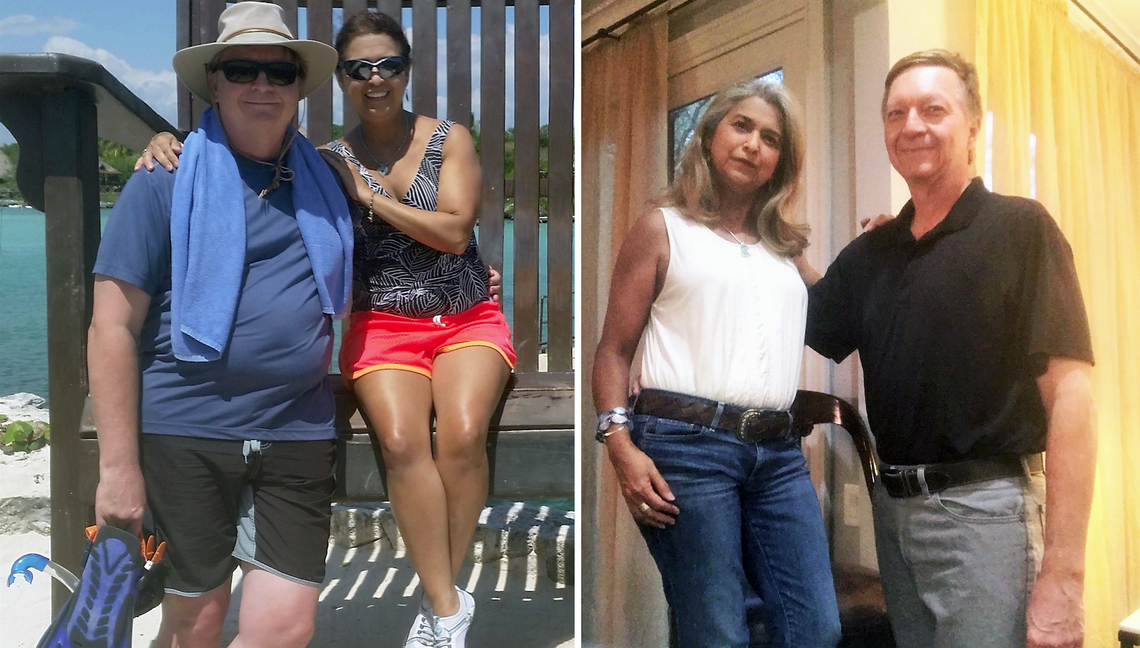It’s easy to pack on extra pounds while in a happy relationship; it’s such a common occurrence that “relationship gut” has become a part of the common American lexicon.
Shelby and Ana Oostwouder were among the 66 percent of couples who report gaining weight while in a relationship. Despite their best efforts to eat healthy, Shelby Oostwouder eventually reached 270 pounds and was diagnosed as prediabetic. But his weight struggle became life-threatening after he was hospitalized for chest pain and pancreatitis during Hurricane Harvey – leaving his wife Ana Oostwouder temporarily trapped alone inside their flooded home in Houston.
Harvey, in its own unfortunate way, jump-started the Oostwouders weight loss, according to Shelby Oostwouder. After staying at a family member's house for several days, the water had lowered enough for them to return to their house that had received 2 feet of water.
“We came back and started cleaning up; we threw out all of our furniture on the bottom floor, tore out 4 feet of drywall,” Shelby Oostwouder said. “But in doing all that, it was such physical work, that I lost more than 10 pounds doing all that, so I said ‘You know I kind of have a headstart on losing weight here.’”
Though their belongings were destroyed, the couple was grateful to have survived. And they decided to get in control of their health again.
The Oostwouders’ story isn’t all that uncommon in the United States, where 36.5 percent of adults are obese and another 32.5 percent are overweight. In all, it’s more likely to be obese in the United States, than not. But obesity unchecked can significantly increase risk for dozens of diseases and conditions like type 2 diabetes, heart disease, stroke, cancer and many other diseases.
Obesity costs Americans approximately $147 billion each year. And people who are obese pay more out of pocket than people who are not. In fact, the medical costs for people with obesity are $1,429 higher each year than those of people with a normal weight.
Within four months of the Oostwouders starting their weight loss journey at Medi-Weightloss, they had lost a combined 73 pounds. Shelby Oostwouder was no longer prediabetic and his blood pressure is now consistently within a normal range.
Their success, in part, according to Medi-Weightloss Associate Medical Director Dr. Sejal Shah, was because they were a couple committed to making healthy lifestyle changes together.
“By far couples do better than individuals alone,” Dr. Shah said. “If you are in a relationship and both individuals are overweight, you would do much better off coming in as a couple for treatment than one of those two people coming in.”
A study conducted by Medi-Weightloss researchers determined that patients who joined with a partner lost, on average, 24 percent more weight and remained in the program 26 percent longer compared to those who joined without a partner.
Established in 2005, Medi-Weightloss is a provider of individualized physician-supervised weight loss programs. Physicians and medical professionals provide individualized care based on each patient’s goals, current health status and medical history.
Anna Oostwouder said a benefit of the Medi-Weightloss program was that it was covered by their health insurance provider.
“The fact that the insurance company does recognize it as a legitimate treatment, gives you a little more confidence that you’re not just following a fad,” she said. “For me, it gave me medical legitimacy and confidence that I wasn’t just going to be doing another ‘bounce around’ diet.”
More than anything, the Oostwouders feel like they’ve learned how to make better and healthier decisions when it comes to food and activity.
“It’s not a matter of trained dieting, it’s a matter of lifestyle preference that happens to be a happier and healthier long-term way of living,” Ana Oostwouder said.
Since they moved to San Marcos in October of 2018, they’ve kept most of the weight off – even through the holidays – and have kept exercise as a regular part of their lifestyle, something they didn’t do before.
“Coming out of the program, we’ve continued to exercise as a standard practice a lot more,” Shelby Oostwouder said. “Of course in Houston it was flat, so I was walking up to 4 miles a day as fast as I could, but now that we live out here in San Marcos, well it’s got a lot of elevation change.”
Medi-Weightloss Chief Science Officer Macklin E. Guzmán said joining forces as a couple during a weight loss journey has its unique advantages and increases the chances of success.
“Mutual support and inspiration are the cornerstones of tackling weight loss together.” Guzmán said. “As a united front, couples adopt a mutual goal toward better health and can help each other through any pitfalls during their weight loss journeys.”
But he also warns of keeping biological differences in mind when it comes to couples' outcomes.
“Keep in mind that men and women lose weight differently due to biology, so comparing weight loss numbers should not be a competition for a couple, but rather an opportunity to support and encourage each other without making comparisons,” Guzmán said.
“For us and a lot of people in our age group, it’s less about being buff and more about being healthy to avoid medical complications down the road, and it’s just kind of a plus if you look better for your spouse along the way,” Ana Oostwouder said.
For more information about Medi-Weightloss, visit their website.









